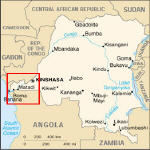Colombant report - Download (MP3)
![]()
Colombant report
- Listen (MP3)
![]()
Human rights activists in the Democratic Republic of Congo fear a cover-up is taking place in the aftermath of violence in the western Bas-Congo region earlier this year. Clashes opposed police and a now banned political religious movement. VOA's Nico Colombant reports from our West and Central Africa bureau in Dakar.
The head of the Congolese-based ASADHO African human rights organization, Amigo Gonde, says his group's work and testimony from residents in the Bas-Congo region indicate the existence of three mass graves. He says several dozen bodies were seen lumped together at three sites. The last mass grave to be discovered was in the town of Materne, between the cities of Boma and Matadi. But he says last week, apparently, the bodies were dug up and moved, as part of a possible cover-up. Residents in Materne say pieces of bodies were left behind, and that there is still a horrible odor, and they wonder if they will get sick. Gonde says the military is guarding the two other sites, so that it is impossible to investigate the other mass graves as well. He says it is very difficult to find out how many people were killed in the unrest. He says residents say they saw many bodies floating in a nearby river as well. The government says fewer than 30 people were killed. Officials from the U.N. peacekeeping mission in Congo says their findings indicate about 100 people were killed. They say they are investigating the reports of mass graves. Other human-rights activists say a local doctor, who had been part of an official inquiry into the violence, was replaced and harassed by authorities after he started speaking of the existence of mass graves. Lawmakers in the capital Kinshasa have called for an independent inquiry. They have also called on the newly outlawed Bundu dia Kongo movement to dismantle its training camps, and to clarify its status before it can become legal again. The group's spiritual leader is also an elected lawmaker, but authorities in Kinshasa say members of his group attack state targets, kill police, and chase away non-natives. The group has also called for the restoration of the pre-colonial kingdom of Kongo, which also includes parts of Angola and Gabon. It has also set up its own tribunal system and a vigilante group called the Makesa, who are armed with whips.

Related articles
- • Jean-Pierre Bemba Returns to DR Congo (August 1, 2018)
- • At least 30 dead after massacres in Ituri (March 2, 2018)
- • Botswana Urges Joseph Kabila to Step Down (February 26, 2018)
- • No elections in DR Congo in December without electronic voting machines: INEC (February 13, 2018)
- • DR Congo reach final of African Nations Championship (February 3, 2016)
- • Political tensions 'running high' in DR Congo ahead of 2016 elections (October 7, 2015)
- • Police Open Fire on Crowd Protesting Election Law Change (January 19, 2015)
- • 15 dead in football match stampede in Kinshasa (May 12, 2014)
- • Security Council extends UN mission, intervention force in DR Congo for one year (March 28, 2014)
- • Death toll in Lake Albert boat accident rises to 108 people (March 24, 2014)
- • M23 Rebels Kill, Rape Civilians in Eastern Congo: Human Rights Watch (July 22, 2013)
- • UN Security Council Condemns Latest M23 Attacks, Extends Sanctions on Rebels (November 28, 2012)
- • Thousands of Women March Against M23 Rebels in Kinshasa (November 24, 2012)
- • Protests Against M23 Rebels, Government and UN Spread (November 22, 2012)
- • Thousands Protest M23 Capture of Goma, Turn on Government and UN (November 21, 2012)
- • Police Investigate Former Prime Minister for Corruption (May 14, 2012)
- • TP Mazembe Reach Sixth Consecutive Champions League Group Stage (May 13, 2012)
- • Kony 2012 video director detained (March 16, 2012)
- • Opposition Supporters Step Up Attacks on Congolese Officials Abroad (February 28, 2012)
- • Tshisekedi Leaves 'House Arrest' to Meet German Ambassador (February 27, 2012)
- • Kabila's Senior Advisor Katumba Mwanke Dies in Plane Crash (February 12, 2012)
- • Tshisekedi's Call for General Strike Largely Ignored (January 31, 2012)
- • Tshisekedi Says He Will Form His Government Next Week (January 21, 2012)
- • Tshisekedi Stages Self-Inauguration at Home (December 23, 2011)
- • Tshisekedi Says He Is President-Elect, Asks Security Forces to Arrest Kabila (December 18, 2011)
- • Joseph Kabila Wins Presidential Election (December 9, 2011)
- • Presidential Election Results Delayed 48 Hours (December 6, 2011)
- • Catholic Church Calls for Calm as Elections Results Are Published (December 4, 2011)
- • Vote Counting Underway after Mostly Peaceful Elections (November 29, 2011)
- • Officials Cancel Final Campaign Rallies in Kinshasa after Clashes (November 26, 2011)







